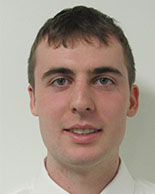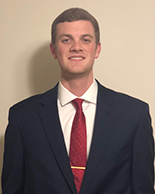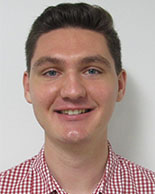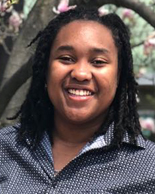Student testimonials
The MSU Cryogenic Initiative combines classroom education with training on cutting-edge technologies and advancements in the cryogenic field that exist and are being implemented at FRIB. Below are testimonials from some of the program’s current students.
Scott Anthony
 Scott Anthony is majoring in mechanical engineering at Michigan State University. He is assisting with the mechanical engineering of the FRIB cryogenic systems. His advisors are Abraham Engeda, a professor of mechanical engineering from the MSU College of Engineering, and Peter Knudsen, senior cryogenic process engineer at FRIB. Scott joined the MSU Cryogenic Initiative in fall 2020.
Scott Anthony is majoring in mechanical engineering at Michigan State University. He is assisting with the mechanical engineering of the FRIB cryogenic systems. His advisors are Abraham Engeda, a professor of mechanical engineering from the MSU College of Engineering, and Peter Knudsen, senior cryogenic process engineer at FRIB. Scott joined the MSU Cryogenic Initiative in fall 2020.
What are your research responsibilities?
As an engineering student at MSU, I was attracted to NSCL/FRIB. As soon as I found out about FRIB, I applied for a position at the lab. When I was awarded an interview during my sophomore year, I learned about cryogenics and the MSU Cryogenic Initiative, and I instantly knew the initiative was something I wanted to be a part of. Additionally, cryogenics is a unique and interesting field that I am eager to learn more about, especially from leaders in the field and all of those associated with the MSU Cryogenic Initiative.
How do you think participating in the MSU Cryogenic Initiative will benefit your career?
I have gained experience working under deadlines and working under pressure. Working closely with engineers has also taught me how many engineers work, plan, and perform tasks. These experiences will continue to benefit my career as an engineer.
What career path do you plan to pursue at this point?
At this point, I plan to continue to be a part of the MSU Cryogenic Initiative until I obtain my bachelor’s degree in mechanical engineering. I currently would like to stay in the program and achieve my master’s degree.
Where you are in the program so far, what is the best part or what are you enjoying and/or learning the most? What has been most rewarding?
I am a junior mechanical engineering student at Michigan State University. My position in the program so far is applying what I learn in class to matters that occur at the FRIB, working with SolidWorks, learning how to read and develop piping and instrumentation diagrams (P&ID's), learning different equipment and parts, as well as learning about what it takes to work for a world class laboratory. The best part is learning about aspects of engineering and running a lab that I would otherwise not have the opportunity to learn. Thus far, I have enjoyed leaning how to read and write P&ID’s as well as how to carry out a pneumatic pressure test. Continuing to learn and meet people at FRIB has been the most rewarding aspect of the MSU Cryogenic Initiative.
Would you recommend to other students this program? Why?
I would highly recommend this program to other students who are serious about their studies and who are eager to learn about cryogenics, a subject that is otherwise not taught in class. You will gain many experiences during your time in the Cryogenic Initiative that will apply to the private sector, as well as experiences you will only gain by working for a world-class laboratory, like FRIB. If the MSU Cryogenic Initiative is something you want to be a part of, do not hesitate to apply.
Jonathon Howard

Jonathon Howard is pursuing a PhD. He is being advised by Professor of Engineering Abraham Engeda, and FRIB Senior Cryogenic Process Engineer Peter Knudsen. He is researching cryogenic turbomachinery. Jonathon joined the MSU Cryogenic Initiative in fall 2018.
What are your research responsibilities?
My current research involves the development of a compressor impeller design and performance prediction code. The goal of this research is to create a robust code that can be utilized in the design of compressors found in sub-atmosphere cryogenic helium systems.
What interested you about the MSU Cryogenic Initiative/pursuing this educational path?
During my undergraduate studies, I was interested in aeronautics/aerospace and found myself looking for opportunities to further my education in a manner that could translate to a position in those fields. My interests made the MSU Cryogenic Initiative very desirable, as I could use the knowledge learned from the cryogenic and turbomachinery departments to achieve my career goals.
How do you think participating in the MSU Cryogenic Initiative will benefit for your career?
The MSU Cryogenic Initiative at MSU involves working at a world-class facility which employs many leaders in physics and engineering. The amount of knowledge that can be learned from working at FRIB would have a large impact on anyone who is prepared to learn and willing to work hard. I believe the knowledge and experience that I gain during my time in the MSU Cryogenic Initiative will be very beneficial in the pursuit of my future career.
What career path do you plan to pursue at this point?
The career path that I am most interested in pursuing is working in the aeronautical or aerospace industry. I am also interested in working as a process engineer at a cryogenic or power plant.
Would you recommend the MSU Cryogenic Initiative to other students? Why?
Yes, I would highly recommend the MSU Cryogenic Initiative program to other students. It isn’t often that a graduate student would have the opportunity to be involved in the construction of a world-class accelerator facility. Working at FRIB allows insight into the process of creating the entire system involved with the accelerator, and would be very valuable to any student interested in going into a career associated with accelerators or accelerator support systems.
Is there anything else you would like to add about your experience with the MSU Cryogenic Initiative?
The integration of the College of Engineering and FRIB has been beneficial, with the addition of classes that introduce engineering students to the technologies utilized at FRIB. I hope to see new engineering students joining the program in the future.
Duncan Kroll

Duncan Kroll is a PhD student pursuing a degree in mechanical engineering at Michigan State University. His advisors are Abraham Engeda, a professor of mechanical engineering from the MSU College of Engineering, and Nusair Hasan cryogenics staff engineer at FRIB. For his research, he is attempting to characterize the deposition of frost onto heat exchanger surfaces from helium. Duncan joined the MSU Cryogenic Initiative in fall 2018, earned his Master of Science degree in May 2020, and is continuing the program to earn his PhD.
What are your research responsibilities?
My research responsibilities have included process design and optimization of a helium purifier (which I designed mechanically for my master's degree), characterizing frost collection from a stream of air or helium, as well as modeling, measuring, and evaluating data for various aspects regarding the operation of the FRIB. These include partial load operation of turbines and compressors, purifier water and air capacity, and purifier liquid nitrogen and helium usage.
How do you think participating in the MSU Cryogenic Initiative will benefit your career?
It will give me the opportunity to make a lot of connections and work at a world-class facility. My initial interest came from funding opportunities for master’s students at FRIB and a referral from a mentor, but I have been interested in accelerator science ever since I toured NSCL with my high-school chemistry class.
Would you recommend this program to other students?
I would recommend this program to other students. It is an opportunity to work at a world class facility, on important projects, with very knowledgeable people. As a resume builder, that’s about as good as it gets.
Tasha L. Williams

Tasha L. Williams is pursuing a PhD in mechanical engineering at Michigan State University. She is from Melbourne, Florida. Tasha is being advised by Professor of Engineering Abraham Engeda, and FRIB Senior Cryogenic Process Engineer Peter Knudsen. She is researching the improvement and efficiency of rotary screw compressors. She became interested in MSU Cryogenic Initiative when she heard about so many others excelling in her field while studying there. Tasha joined the MSU Cryogenic Initiative in fall 2017.
What are your research responsibilities?
My research responsibilities include attempting to characterize and better understand the helium compression process in a rotary screw compressor that uses oil for cooling. In particular, I research the nature of the helium-oil thermal equilibrium (or non-equilibrium), and how that influences the effective polytropic coefficient for the compression process.
How do you think participating in the MSU Cryogenic Initiative will benefit for your career?
I think it will help catapult me and put me in connection with the right people while also preparing to fill the role.
